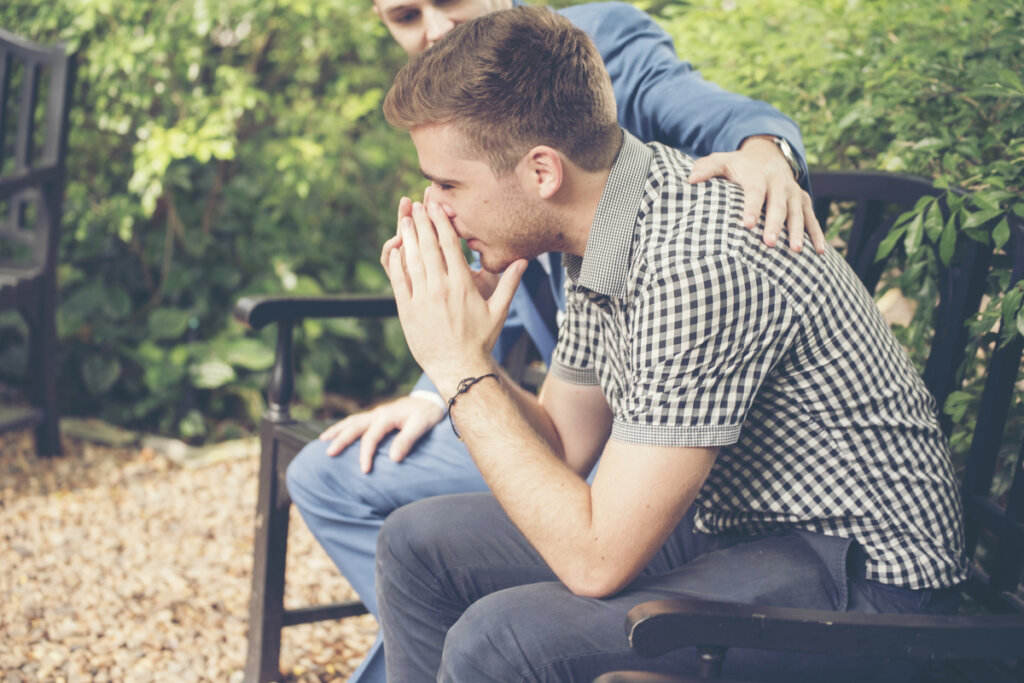The Impact of OCD on Interpersonal Relationships


Written and verified by the psychologist Valeria Sabater
It’s not always talked about, but the impact of obsessive-compulsive disorder (OCD) on families, partners, and even friendships can be extremely problematic. Although this condition falls on a spectrum and not all patients are the same, it’s common for notable challenges to appear that are capable of producing great psychosocial deterioration.
In fact, fear, anxiety, and intrusive and persistent thought loops are common in OCD. Indeed, sufferers often test the patience of those who have to live with their obsessive thoughts and/or ritualized behaviors. They view them as a real source of suffering.
Not everyone understands these kinds of behaviors. Moreover, along with incomprehension, rejection often occurs.
The extent of the difficulties a sufferer of OCD experiences in their close environment always depends on the degree of their disorder. Those who exhibit obsessive behaviors linked to health or cleanliness tend to suffer more in their daily relationships.
The impact of OCD on the sufferer’s social environment

There are large individual differences in how OCD affects families, partners, or friendships. Many patients come to therapy tired of the wear and tear that their routines cause in others which have become sources of conflict. In fact, sufferers’ social deterioration can be immense.
A study conducted by Keith D. Renshaw et al, published by Oxford Academic, states that it’s common for the OCD sufferer to experience significant problems on a social and interpersonal level. Although these conflicts can generate suffering in all their relationships, the family is the most frequent.
The suffering is linked with feelings of impotence. That’s because those who want to help OCD sufferers are unable to do so effectively. In these cases, psychoeducational is key, both for patients and their environments. Next, we’re going to explore how OCD affects different social spheres.
You might be interested to read: The Effects of Anxiety and Depression on Obsessive Compulsive Disorder
1. Impact on the family
The impact of obsessive-compulsive disorder on the family is often more complex than is believed. This is mainly because the condition tends to be misdiagnosed. In fact, almost 50 percent of cases are misdiagnosed or receive inadequate treatment (Glazier et al., 2013, 2015; Perez et al., 2022 ).
- The close circle of the sufferer doesn’t know how to help them.
- Patients with OCD suffer along with their parents and siblings who don’t understand their behavior.
- Their environment carries out inappropriate patterns. For instance, criticizing the sufferer’s rituals and ridiculing their behaviors or concerns.
- The sufferer feels misunderstood. This further elevates their anxious thoughts.
- Patients involve their family members so that they become a part of their rituals. It’s known as family accommodation. It consists of modifying routines to allow the OCD sufferer to integrate their compulsive behaviors.
Many families end up accommodating the compulsive rituals of the OCD sufferer, so as not to contradict them and not cause them more stress. They might even believe it’s just a passing phase.
2. Impact on friends, acquaintances, and colleagues
OCD sufferers often have low self-esteem. They might also suffer from covert depression due to the weight of their fears and untreated obsessive thoughts. This means it’s extremely difficult for them to build healthy social relationships.
- They feel discriminated against by acquaintances or colleagues.
- They suffer from high insecurity in their daily interactions with acquaintances and colleagues.
- They’re conditioned by feelings of shame. They worry about being judged, singled out, or mocked about their obsessions or rituals.
- They find it difficult to maintain friendships. In fact, they often gravitate between the need for closeness and validation from others and the desire for isolation.
- They have a hard time holding down jobs. This is because it’s difficult for them to be punctual and productive. They also fear being pointed out or stigmatized by their bosses or colleagues, due to their conduct.
- Many people with OCD suffer in silence over being unable to integrate into their social settings and not acting, responding, and performing as effectively as others.
3. OCD and affective relationships
The impact of obsessive-compulsive disorder on affective relationships is often problematic. The OCD sufferer tends to doubt any relationship, no matter how solid it may be. They experience continuous doubts and are unable to enjoy love.
- They’re further defined by a complex combination of anxious and avoidant attachment. In other words, they crave constant reinforcement from their partner but, in turn, the fear of being abandoned drives them to avoid and distance themselves from them.
- This chaotic behavior exhausts their partner. Unsurprisingly, abandonment and breakups are frequent. These scenarios cause continuous wounds which further encourage patterns of fear, anxiety, and ruminating thoughts.
- Many OCD sufferers develop relationship OCD. It means their partner occupies all their time and they become obsessed with them. Moreover, a fear of abandonment and the persistent and self-destructive need to provide their partner with endless signs of affection appear.
The sufferer of relationship OCD is unable to hold down a job or focus on anything else other than their partner. They combine their obsessive thoughts with a fear of abandonment. They also perform ritual behaviors to release their anxiety.

How to help the OCD sufferer
How can you help if you’re family, partner, friend, or acquaintance of an OCD sufferer? The most important thing you need to know is what their disorder entails. Psychoeducation in OCD contributes to society developing a more sensitive view of this reality. Additionally, it provides certain support guidelines.
Allow space for them to worry without reinforcing their obsessions
Some families and partners reinforce the OCD sufferer’s rituals. For example, by helping them sort their food by color. However, you shouldn’t accommodate their compulsive behavior, nor change your routines for them. The best thing to do is to give them space to talk about their fears and obsessions, but without ever facilitating their rituals.
Don’t allow them to develop evasive behaviors
A friend or acquaintance with OCD may be avoiding increasingly more responsibilities and simple tasks. They exhibit avoidance behavior that fuels their anxiety. Don’t make life easy for them in this regard. Reason with them and be supportive so that they don’t fall into a persistent evasion loop.
OCD is treatable. Encourage sufferers to seek specialized help
The impact of OCD on interpersonal relationships can be immense. This can lead the sufferer to a state of great psychosocial exhaustion in which other comorbidities such as depression might appear. If you have a family member, partner, or acquaintance with OCD, steer them toward requesting professional help.
Behavioral exposure therapy with response prevention is extremely effective in treating this condition. According to a study conducted by Northwestern University (USA), this method is supported by good scientific evidence. It makes it easier for the sufferer to understand the disorder and reduce their anxiety so they can avoid compulsions or rituals.
The sufferer of OCD needs to undertake a therapeutic journey so they can let go of many of their fears and shape a healthier mental approach. After all, everyone deserves to build happy and fulfilling relationships. Maybe you can be the helping hand that guides your loved one toward their improved well-being.
All cited sources were thoroughly reviewed by our team to ensure their quality, reliability, currency, and validity. The bibliography of this article was considered reliable and of academic or scientific accuracy.
- Cain, N. M., Ansell, E. B., Simpson, H. B., & Pinto, A. (2015). Interpersonal functioning in obsessive-compulsive personality disorder. Journal of personality assessment, 97(1), 90–99. https://pubmed.ncbi.nlm.nih.gov/25046040/
- Doron, G., Derby, D., Szepsenwol, O., Nahaloni, E., & Moulding, R. (2016). Relationship Obsessive-Compulsive Disorder: Interference, Symptoms, and Maladaptive Beliefs. Frontiers in psychiatry, 7, 58. https://www.ncbi.nlm.nih.gov/pmc/articles/PMC4834420/
- Fischer, M. S., Baucom, D. H., Abramowitz, J. S., & Baucom, B. R. W. (2022). Interpersonal emotion dynamics in obsessive–compulsive disorder: Associations with symptom severity, accommodation, and treatment outcome. Couple and Family Psychology: Research and Practice. Advance online publication. https://psycnet.apa.org/doiLanding?doi=10.1037%2Fcfp0000218
- Glazier, K., Swing, M., & McGinn, L. K. (2015). Half of obsessive-compulsive disorder cases misdiagnosed: vignette-based survey of primary care physicians. The Journal of clinical psychiatry, 76(6), e761–e767. https://pubmed.ncbi.nlm.nih.gov/26132683/
- Law, C., & Boisseau, C. L. (2019). Exposure and Response Prevention in the Treatment of Obsessive-Compulsive Disorder: Current Perspectives. Psychology research and behavior management, 12, 1167–1174. https://www.ncbi.nlm.nih.gov/pmc/articles/PMC6935308/#:~:text=Overall%2C%20about%2050%E2%80%9360%25,to%20be%20maintained%20long-term.
- Solem, S., Haaland, A., Hagen, K., Launes, G., Hansen, B., Vogel, P., & Himle, J. (2015). Interpersonal style in obsessive compulsive disorder. The Cognitive Behaviour Therapist, 8, E29. doi:10.1017/S1754470X15000719
- Renshaw, Keith D. and others. (2023). ‘ The Role of Family and Social Relationships in OCD and Spectrum Conditions’, in Gail Steketee (ed.), The Oxford Handbook of Obsessive Compulsive and Spectrum Disorders, Oxford Library of Psychology (2011; online edn, Oxford Academic, 18 Sept. 2012). https://doi.org/10.1093/oxfordhb/9780195376210.013.0035, accessed 26 Apr. 2023.
- Tibi, L., van Oppen, P., van Balkom, A. J. L. M., Eikelenboom, M., Emmelkamp, P. M. G., & Anholt, G. E. (2019). Predictors of treatment outcome in OCD: An interpersonal perspective. Journal of anxiety disorders, 68, 102153. https://pubmed.ncbi.nlm.nih.gov/31704634/
- Walseth, Liv & Haaland, Vegard & Launes, Gunvor & Himle, Joseph & Håland, Åshild Tellefsen. (2017). Obsessive-Compulsive Disorder’s Impact on Partner Relationships: A Qualitative Study. Journal of Family Psychotherapy. https://www.tandfonline.com/doi/abs/10.1080/08975353.2017.1291239?journalCode=wjfp20
This text is provided for informational purposes only and does not replace consultation with a professional. If in doubt, consult your specialist.








